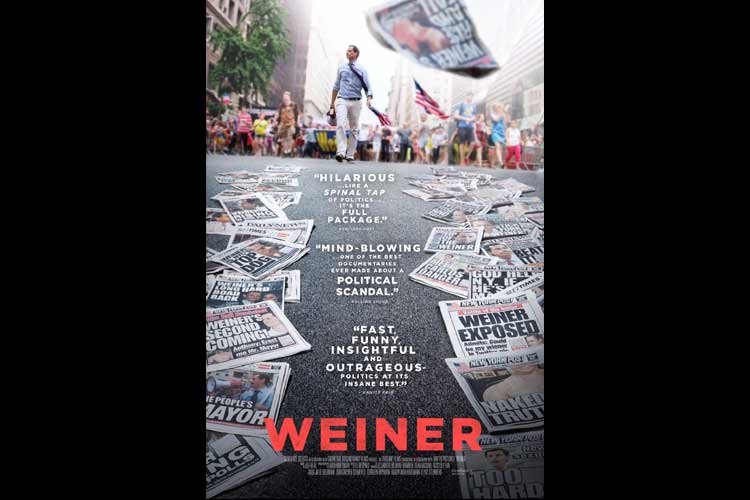The following questions and answers are excerpted from a conversation that followed the NBR screening of Weiner
What was your relationship with Anthony Weiner before starting to work on this film?
Josh Kriegman: I actually met Anthony while working for him in politics. I was his chief of staff for a couple of years while he was in Congress. And so we got to know each other well through that work, and then I left politics and moved into filmmaking. It was at that time that Anthony got caught up in his scandal and resigned. And we started a conversation with him after that about the possibility of making a documentary. And it was really a conversation that went on over the course of a couple years, actually, going back and forth and batting around ideas of how it would work, if he would be comfortable with it, and so forth. And it seemed like he actually wasn’t going to go for it. He was trying to figure out what to do with his life, maybe running for mayor… And the morning that he announced he was running for mayor (two years after he initially resigned), I got a text from him saying, “Alright, I’m in the race, if you want to come with your camera and make this documentary, you can.”
Elyse Steinberg: I actually didn’t know Anthony prior to working on this film. So in many ways I was just like the audience: All I knew was what I had read in the paper. So I had some preconceived notions of him. But when I met him, and when I looked through the material, I did see a more complicated, nuanced person than the caricature he had become. So I think that was the way we began to approach this material.
“he talks about wanting to be viewed as more than a punch line”
Why did he let you make this film, if he was in the midst of a personal controversy?
JK: One of the ground rules for the whole shoot was that anytime he wanted me to turn off the camera, or leave the room – and there’s a couple of time in the film where you see that happening – it would be totally OK for me. That was part of the dynamic throughout. But it was a question that we wondered about, and he does get out an answer eventually. He shrugs it off at first, but in the final bite of the film he talks about wanting to be viewed as more than a punch line, and as the whole person that he is. And I think… you know, he had been through this experience in the first scandal of having essentially his entire life over two decades in public service wiped out and replaced with this one caricature version of himself. And I think he knew getting into the mayor’s race that, you know, it might go that way again. And it sort of did. So having another camera in the room to document this other version of the story that was more complex and nuanced and real, was something that I think he really wanted.
Can you discuss your interactions with Huma Abedin? Normally in a documentary like this one, every character eventually lets down their guard and opens up to the camera. But she never seems like she does.
ES: She’s clearly much more quiet and reserved than Anthony. She’s like the opposite in that regard. Much more camera shy. So I think the relationship we had was primarily with Anthony, but the times that we did have her, those are what you see in the film. That said, she did – just as Anthony was reduced to a caricature and a punch line – so was she. And you see that in the film, and I do think she shared some of his desire of wanting a different version of her story told. A more varied and complete one to be out there, to be seen as not just this one version everyone is talking about, but also as a wife, a mother, as someone doing a very important job. And I do think in the film you get a much more human version of her than what was available in the tabloids.

